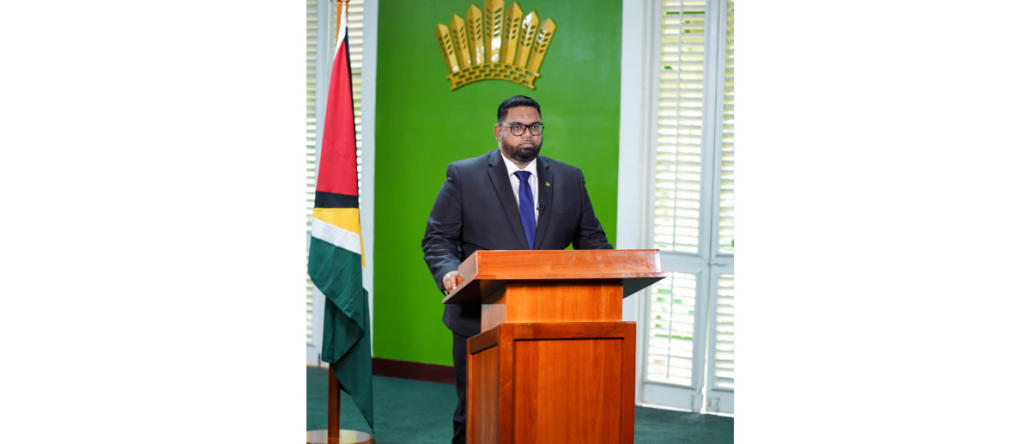

Guyana’s Head of State, President Irfaan Ali in a speech to the nation on Saturday completely rejected the latest decree issued by Nicholas Maduro of Venezuela where he places new claims to the water and seabed off the coast of Guyana, west of the Essequibo River.
Dr Ali said the Officer in Charge of the Venezuelan Embassy in Georgetown was summoned to Takuba Lodge earlier on Saturday by the Minister for Foreign Affairs and International Cooperation, Hugh Todd where Guyana’s “deep concern” was expressed.
“The Officer in Charge was told to convey to the Venezuelan authorities in Caracas, that Guyana, in accordance with international law, and an assertion of his sovereignty and territorial integrity, completely rejected the decree issued by President Maduro. Guyana will continue on the path of peaceful resolution of this issue in accordance with international law and the jurisdiction of the ICJ. We urge our neighbor Venezuela to do the same, ”said Dr. Ali.
The President told his compatriots and women in a televised speech from State House that Guyana continues to look forward to a peaceful resolution of the decades-long border dispute between neighboring provinces, in accordance with international law.
The President said Maduro clearly violated the principles of international law by unilaterally declaring that the sea near Essequibo Guyana belongs to Venezuela.
“Unfortunately, by ruling that the seas adjacent to this territory belong to Venezuela, at least two basic principles of international law have been broken. The first offense is that no State can unilaterally set its international borders, whether land or maritime.
“The imposition of an international border under international law can only come from an agreement between neighboring States, or a binding decision of an international court or arbitral tribunal. Therefore, this attempt by Venezuela to seek, unilaterally, to repair its land and maritime borders with Guyana is legally void, which cannot, and will not, be respected by any other State in the world, by including Guyana. ”
President Ali insisted on the validity and binding effect of the 1899 Arbitration Award that set the boundaries between the two countries and said he was confident that the International Court of Justice (ICJ) will confirm that.
The Head of State said Guyana will warn the International Community, including its sister states in the Caribbean Community (CARICOM) and in America of the danger to international peace and security threatened by the “Venezuela decree on Thursday that violates the basic principles of international law. ”
Dr. Ali that Maduro committed another offense when he made the decree because it went against established rules and basic principles that the land dominated the sea.
To this end, he said only Guyana can enjoy sovereign rights over the sea and seabed near its land. He believes the land and maritime claims from Venezuela will be resolved when the ICJ hears and controls in the matter.
But Venezuela had rejected the recent ruling delivered by the International Court of Justice (ICJ) in which it ruled that it had jurisdiction to hear the case of the Guyana / Venezuela controversy.
“Venezuela does not have the right to overturn the court ruling… hopefully the government will reconsider its position and take part in the rest of the case. If Venezuela chooses to boycott the ICJ case it will not prevent or delay the court adjudicating the case, ”he added.
In the ruling, ICJ President Judge Abdulqawi Ahmed Yusuf said the court had concluded that it had jurisdiction to hear Guyana’s claims about the validity of the 1899 Award and related questions about the definitive settlement of the land boundary dispute.
The court decided that on January 30, 2018, the referral of the matter to the ICJ by the UN Secretary-General António Guterres was legal as contemplated in the agreement.
Judge Yusuf expressed remorse for the decision made by Venezuela not to participate in the hearings so far. He said the lack of appearance of any party had a negative impact on the administration of justice, but noted that the ruling even in Venezuela’s absence, was final and binding on both sides.
The Court President said now that the ICJ has claimed jurisdiction, Venezuela will be able, if it wishes, to appear before the court to present its arguments.
According to the ruling, the 1899 Prize states that Guyana and Venezuela have consented to the means of judicial settlement. The full text of the award will be available on the ICJ website soon.
Venezuela maintains a claim to 70% of Guyana’s territory, arguing that the 1899 agreement, which determined the borders between the two countries, was void.